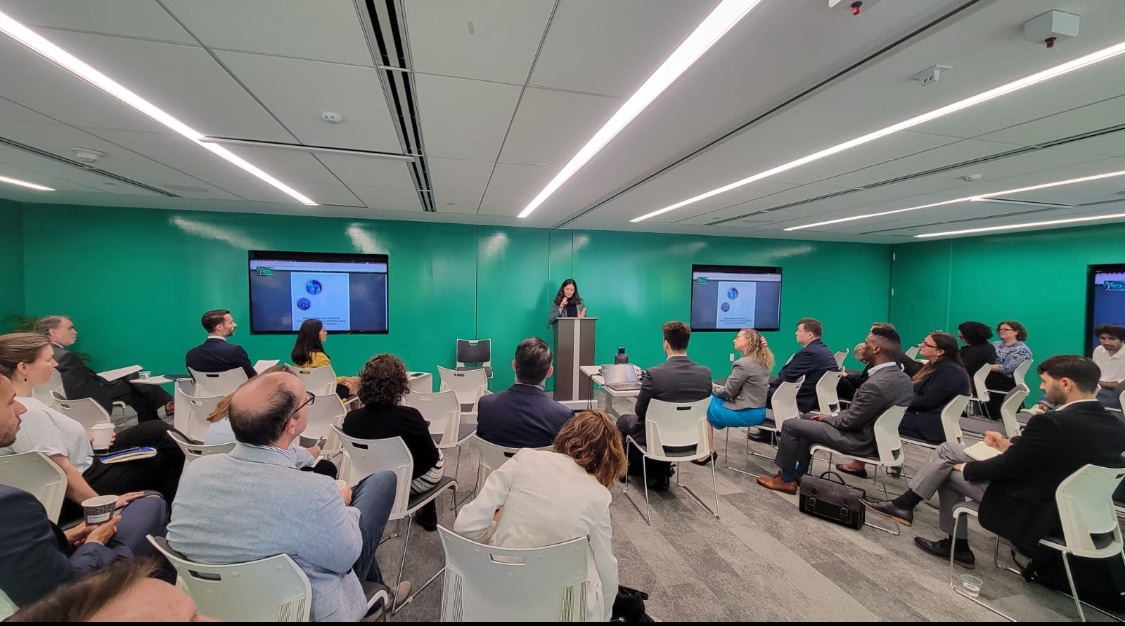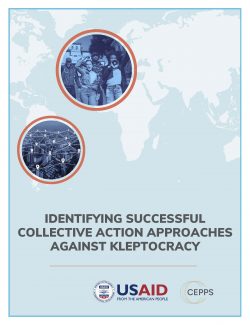Standing Up Together Against Bribes, Repression, and Kleptocrats
People around the world are uniting to fight against corrupt leaders who enrich themselves at the expense of their countries. Known as kleptocrats, these leaders misuse their power to steal public resources, which systematically undermines democracy. Collective action—where people, organizations, and businesses come together to push for change—is a powerful way to stand up against kleptocrats and demand accountability. To support a deeper understanding of what makes such movements successful, a new website offers many resources on collective action against kleptocracy across the globe.
CIPE’s Partnership with IRI on a CEPPS DEPP Project

CIPE’s Anti-Corruption and Governance Center (ACGC) partnered with the International Republican Institute (IRI) to research collective movements against kleptocracy in seven countries: Armenia, Guatemala, Malaysia, Romania, Moldova, Thailand, and Ukraine. This research was informed by international and local experts and supplemented by podcasts and videos. All of these resources were produced as a part of USAID-funded, Consortium for Elections and Political Processes (CEPPS) Democratic Elections and Political Processes (DEPP) project to inform anti-corruption practitioners, policymakers, the business community, and civil society about the importance of key collective action approaches and the role of anti-corruption champions in the fight against kleptocracy.
The report, Identifying Successful Collective Action Approaches Against Kleptocracy, is now available to the public. While each case study is different, the report outlines common factors that triggered mass movements against kleptocrats and ultimately resulted in positive change. It establishes a foundation of knowledge on what it takes to effectively and rapidly respond when the window for reforms opens. Notably, the power of citizen movements, civil society groups, private sector leaders, and government actors coming together against theft and injustice strongly resounds across country contexts.
Collective Action Against Kleptocracy in Moldova, Ukraine, and Thailand
CIPE contributed to the completion of three case studies in the overall report: Moldova, Thailand, and Ukraine – each providing unique and vital contributions. In Moldova, a bank fraud scandal and a constitutional crisis led Moldovans to unite in the streets in support of a reform-oriented candidate, Maia Sandu, and her anti-kleptocratic agenda. In Ukraine, following President Yanukovych’s refusal to sign an EU association agreement and democratic backsliding favoring ties with Russia, mass protests erupted, and civil society backed everyday citizens in public calls for anti-corruption reforms and EU integration. Finally, in Thailand, in 2010, business leaders formed the Thai Collective Action Against Corruption (Thai CAC), catalyzing mobilization of the private sector to set new compliance standards across the country to improve their global economic standing.
A New Podcast Series: Collectively Combating Kleptocracy
Kleptocrats frequently adapt to new situations and will try to undermine the calls for transparency and accountability to re-establish their power. However, once the tides of change rise up, it becomes more difficult for kleptocratic leaders to legitimately stay in public office. The report provides key takeaways that address context-specific sensitivities, with the aim of providing roadmaps for movements to maintain positive and structural changes in their countries. The report has been vetted through a diligent peer review process and accompanied by short videos explaining the case studies, as well as the Collectively Combating Kleptocracy podcast series – all available on the new website.
Celebrating the Public Report Launch with Partners
 CEPPS partners, CIPE and IRI, launched the report and all related resources at a public event at the Open Gov Hub in Washington, D.C. on September 19, 2024. Shannon Green USAID’s Assistant to the Administrator of the Bureau for Democracy, Human Rights, and Governance (DRG) and Patrick Quirk, IRI’s Vice President for Strategy, Innovation, and Impact, opened the event with powerful remarks on the importance of fighting kleptocracy as a global priority in the wider anti-corruption context. CIPE’s ACGC Program Manager, Izabela Chmielewska, and IRI’s Senior Governance Specialist, Utpal Misra, presented the findings and recommendations from the report, providing key insights into collective action strategies to combat kleptocracy.
CEPPS partners, CIPE and IRI, launched the report and all related resources at a public event at the Open Gov Hub in Washington, D.C. on September 19, 2024. Shannon Green USAID’s Assistant to the Administrator of the Bureau for Democracy, Human Rights, and Governance (DRG) and Patrick Quirk, IRI’s Vice President for Strategy, Innovation, and Impact, opened the event with powerful remarks on the importance of fighting kleptocracy as a global priority in the wider anti-corruption context. CIPE’s ACGC Program Manager, Izabela Chmielewska, and IRI’s Senior Governance Specialist, Utpal Misra, presented the findings and recommendations from the report, providing key insights into collective action strategies to combat kleptocracy.
Andrew Wilson, CIPE’s Executive Director, closed the event with remarks emphasizing the significance of these collective efforts – including key contributions from the private sector. He encouraged the participants to build on the momentum created by this report launch with many key partners present. His words provided a thoughtful conclusion, centering CIPE as a vital partner in collective efforts around the globe to limit kleptocratic power and bolster free-market democracy around the world.
This project represents CIPE’s commitment to fighting kleptocracy through empowering local democratic movements. It sheds light on the wider importance of anti-corruption efforts everywhere, as well as CIPE’s efforts to bring stakeholders across sectors toward the shared goal of implementing positive democratic and economic policy reforms around the world. We invite you to delve deeper into the lessons by visiting the new website.
